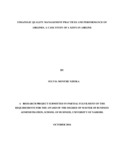| dc.contributor.author | Nzioka, Sylvia M | |
| dc.date.accessioned | 2017-01-05T07:43:59Z | |
| dc.date.available | 2017-01-05T07:43:59Z | |
| dc.date.issued | 2016 | |
| dc.identifier.uri | http://hdl.handle.net/11295/99058 | |
| dc.description.abstract | The demand for air transport has increased steadily over the past years as marked by the growth of passengers and freight traffic by 45% and 80% respectively. The rapid expansion in Africa’s aviation industry is nonetheless lagging behind that of the rest of the world as it is hampered by poor quality management practices despite their popularity in adoption. This has resulted in the notable deterioration of the performance of most of the airlines in Africa. This study therefore sought to determine the effect of strategic quality management practices on the performance of the airline industry through a case study of one of the Kenyan airlines. Specifically, it sought to determine whether strategic quality management practices namely six sigma, ISO-9000, business process re-engineering and learning organization were employed in the organization. The study also sought to determine the effect of the implementation of strategic quality management practices on their overall performance. The indicators of performance under review were customer and employee satisfaction, profitability and innovat1ion. To achieve these objectives, an exploratory research design was adopted and data collected using questionnaires from strategically sampled respondents who are employees of the airline. Data collected was analyzed and processed using an appropriate statistical package to draw conclusions of the study objectives. The findings of this study established a correlation value of 0.824 which indicates that there exists a strong positive relationship between strategic quality management practices and organization performance at 95% significant level. It was recommended that the observed lapses in efficient strategic quality management should be minimized to ensure that error-free transactions are achieved and all stakeholders are satisfied with the level of efficiency. Future research should extend the findings of this study and provide the perspective of customers in regards to the quality of service in Kenyan airlines. | en_US |
| dc.language.iso | en | en_US |
| dc.publisher | University of Nairobi | en_US |
| dc.rights | Attribution-NonCommercial-NoDerivs 3.0 United States | * |
| dc.rights.uri | http://creativecommons.org/licenses/by-nc-nd/3.0/us/ | * |
| dc.title | Strategic Quality Management Practices and Performance of Airlines. A Case Study of a Kenyan Airline | en_US |
| dc.type | Thesis | en_US |



